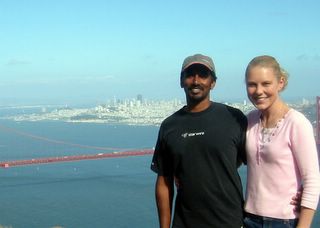Risky or Foolish?
I've always thought of myself as being fairly conservative when it comes to taking risks. I don't trade options, play roulette, scuba dive, or other high-risk activities. But thinking back on my life, it seems that I have actually engaged in several activities which are considered fairly dangerous, risking my life, limb, or money:
- Day traded the Stock Market
- Invested in and Started small businesses
- Bought almost fully-leveraged real estate
- Played Poker (low-stakes)
- Piloted small single-engine aircraft
- Skied Black Diamonds
I have won some and lost some (money, not life or limb), but while it seems that I have a higher tolerance for risk than average, "Fools rush in" does not describe my approach. As I gain more knowledge or skill in any of the activities listed above, the risk I take decreases proportionately.
How is risk calulculated? Risk combines the probability of a negative event occurring with how harmful that event would be. (Risk / Reward is a different analysis)

Consider driving. Historically in the US, each year there are 20-30 fatalities per 100,000 drivers.
1) The probability being killed in a car accident is about 0.025%.
2) On a scale of 1 to 100 (100 being the highest), the "Consequence #" would be 100 (Death).
3) 0.025% * 100 gives a Risk of 2.5.
If I decide that my risk tolerance is 20, then driving is an acceptable risk.
So when I look at the risks of playing poker, it goes like this:
1) Assume I am new to the game, and I believe that I'll lose everything 80% of the time.
2) I buy into a $100 table, which I'll assign a 40 out of 100 Consequence #.
3) Therefore, 80% * 40 = Risk 32
32 is above my risk tolerance of 20, so this activity would be too risky. However, there are options for reducing my risk:
1) By increasing knowledge I could improve my chances to losing only 20% of the time.
2) By decreasing my potential loss to $5, the Consequence # would be about 10.
3) 20% * 10 = Risk 2
A person playing poker in this second scenario assumes about the same risk as someone driving down the street.
How many activities in life are 100% guaranteed to succeed? Ecclesiastes 11 says:
Outcomes of endeavors in this life are not certain. Since things that appear safe sometimes fail and risky ventures sometimes pan out, taking a variety of calculated risks with the right level of potential loss and knowledge seems to be the wisest path.
- Day traded the Stock Market
- Invested in and Started small businesses
- Bought almost fully-leveraged real estate
- Played Poker (low-stakes)
- Piloted small single-engine aircraft
- Skied Black Diamonds
I have won some and lost some (money, not life or limb), but while it seems that I have a higher tolerance for risk than average, "Fools rush in" does not describe my approach. As I gain more knowledge or skill in any of the activities listed above, the risk I take decreases proportionately.
How is risk calulculated? Risk combines the probability of a negative event occurring with how harmful that event would be. (Risk / Reward is a different analysis)

Consider driving. Historically in the US, each year there are 20-30 fatalities per 100,000 drivers.
1) The probability being killed in a car accident is about 0.025%.
2) On a scale of 1 to 100 (100 being the highest), the "Consequence #" would be 100 (Death).
3) 0.025% * 100 gives a Risk of 2.5.
If I decide that my risk tolerance is 20, then driving is an acceptable risk.
So when I look at the risks of playing poker, it goes like this:
1) Assume I am new to the game, and I believe that I'll lose everything 80% of the time.
2) I buy into a $100 table, which I'll assign a 40 out of 100 Consequence #.
3) Therefore, 80% * 40 = Risk 32
32 is above my risk tolerance of 20, so this activity would be too risky. However, there are options for reducing my risk:
1) By increasing knowledge I could improve my chances to losing only 20% of the time.
2) By decreasing my potential loss to $5, the Consequence # would be about 10.
3) 20% * 10 = Risk 2
A person playing poker in this second scenario assumes about the same risk as someone driving down the street.
How many activities in life are 100% guaranteed to succeed? Ecclesiastes 11 says:
4 Whoever watches the wind will not plant;
whoever looks at the clouds will not reap.
5 As you do not know the path of the wind,
or how the body is formed in a mother's womb,
so you cannot understand the work of God,
the Maker of all things.
6 Sow your seed in the morning,
and at evening let not your hands be idle,
for you do not know which will succeed,
whether this or that,
or whether both will do equally well.
Outcomes of endeavors in this life are not certain. Since things that appear safe sometimes fail and risky ventures sometimes pan out, taking a variety of calculated risks with the right level of potential loss and knowledge seems to be the wisest path.


0 Comments:
Post a Comment
Subscribe to Post Comments [Atom]
<< Home